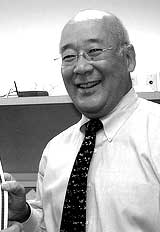
(Photo: ShoForMayor.com)
Oregonian politics blogger Jeff Mapes asked mayoral hopeful Sho Dozono what he thinks of the “Safe, Sound, and Green Streets” funding plan crafted by City Commissioner (and Dozono’s political rival) Sam Adams.
His answer seems to cement speculation about Dozono’s ties with the various lobbyists and special interests that oppose the fee-based plan.
Here’s a snip from Mapes’ blog:
“…Dozono added, “…the whole process was more about backroom dealing. I think I would prefer that the citizens would have a choice to vote on this from the beginning.”
Mapes also reports that Dozono says, “he hadn’t decided yet how he’d vote on the $464 million package” if indeed it did make it to the ballot.
I hope to get a hold of Dozono for an interview soon, but what strikes me about his quotes is that he repeats this notion of “backroom dealing” (which is the same phrase used by others that oppose the “Safe Streets” plan).
I just don’t understand that claim at all.
From my recollection, Adams and his staffers staged a monumental public process that included a series of highly publicized Town Hall meetings (I remember being shocked to see a huge sign for the one in my neighborhood posted to a telephone pole at Peninsula Park), myriad opportunities for public comment, numerous meetings with stakeholders, and an 89-member steering committee made up of community representatives.
One stakeholder invited to be on that committee was controversial lobbyist and head of the Oregon Petroleum Association, Paul Romain. Romain declined the invitation to help shape the proposal, but even so, many of his concerns and requests for changes were still honored (including some key last minute revisions).
I also realize the, “why not let the people vote?” sound bite (which is repeated above by Dozono), is quite seductive. The fact is, we all know that when major monied interests like Big Oil line up against a proposal (which is the case we’re in now), they will go to any lengths to defeat it.
The result of their very deep pockets is that the people do indeed vote, but many of them vote based solely on expensive and flashy media campaigns that deal in sound bites, rather than facts (remember how the tobacco lobby paid $22 per vote to defeat the Measure 50 children’s health care bill?).
Dozono has not shared much detail about his platform, but he has made clear his desire to improve local schools. I wonder if he realizes that this funding plan includes $3.2 million dollars to help improve traffic safety around those schools?
I’ll be curious to learn whether or not Dozono has a better solution than the “Safe Streets” plan for remedying our vast transportation system maintenance backlog and unsafe streets; and whether his plan to help our schools includes making sure kids can get there all in one piece.

